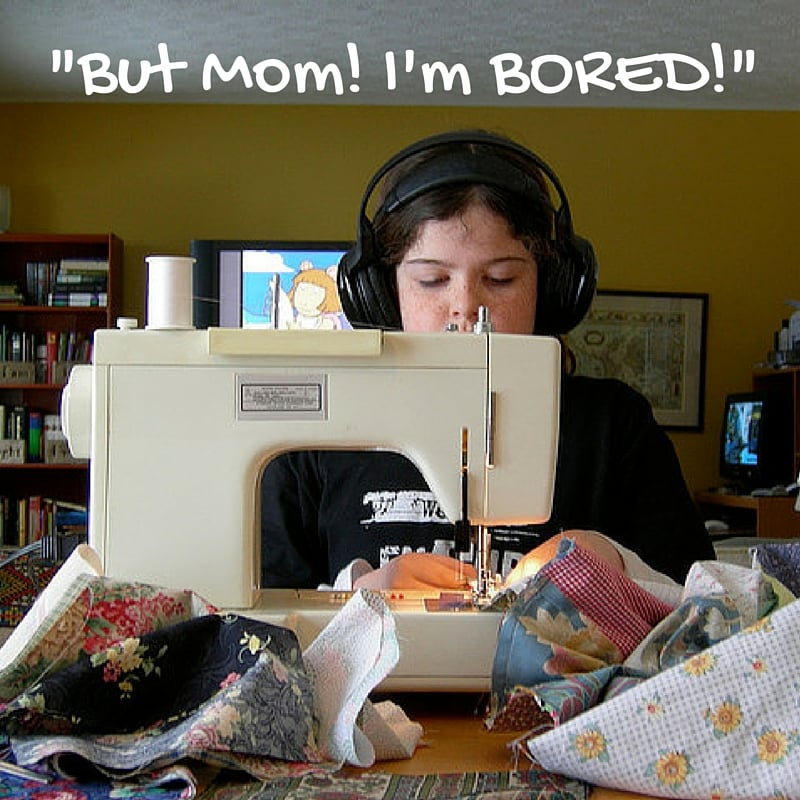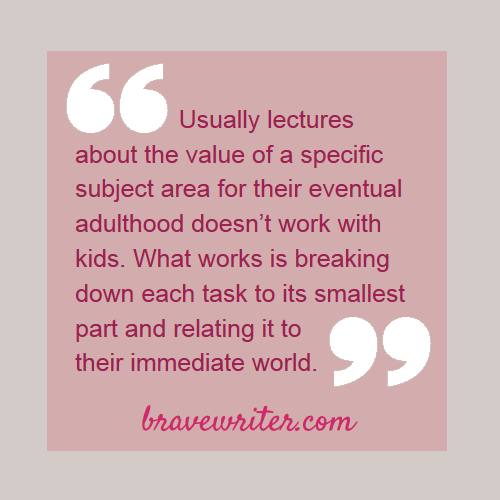Archive for the ‘Brave Writer Philosophy’ Category
Enter Your Child’s World

Sometimes in our eagerness to see our children become independent, we leave them to their interests. We see them happily listening to their favorite musical artists over and over again, we notice them reading an entire series on the universe and star systems, we watch as they perfect a trick in gymnastics or a move in lacrosse, or we try not to be disturbed by how enthusiastically they play an online game.
Sometimes their hobbies and interests create pride in us. For instance, I’ve never met anyone who would be ashamed to see their child mastering chess and entering tournaments, or practicing violin 4-5 hours a day. Kids who learn foreign languages with Rosetta Stone, on their own, because they want to, cause parents to brag about them. Parents are regularly proud of kids whose favorite subject is math, or the history of warfare. They love it when their kids show prowess in “prestige” interests.
Other times, though, our kids get obsessed (our negative word for their passions) with stuff that makes us cringe:
- role playing games,
- online video games,
- fashion,
- make-up,
- coloring books,
- a television series,
- a popular book series read over and over again,
- electric guitar,
- learning Klingon,
- decorating a bedroom,
- rap,
- talking online to friends at all hours of the day and night,
- coding new versions of computer games,
- learning all the statistics for a favorite baseball team…
It’s easy to put a child’s interests into containers (the “good” interest box, and the “bad” interest box). When you do that, your face changes when you talk to your child. You light up when your daughter tells you she learned to play the difficult passage in the concerto, but cringe a little bit when your son tells you he finally beat a level in Halo after hours of playing.
Your response to how your children express their interests generates trust or creates distance between you. For a moment, suspend judgment and think about what your child is learning about learning. We call this “going meta.” The “meta” level of reflection works like this: To have a meta conversation, means you are now talking about talking. To discover the meta-theory means you are developing a theory to discuss theory.
Applied to the idea of learning: the “meta-layer” of learning is examining how learning is happening, not what is being learned. You get up on a high perch, above your child and your child’s interests, looking down at the signs and symptoms of learning rather than the content (what he or she is studying).
When you do this, you begin to see that the features are similar whether studying violin or how to blow away your opponent on a screen. Certainly the skills are different (and we can argue some other time about what is more difficult). But the process—
- deep immersion,
- expanded vocabulary in the field,
- complex sorting of information,
- discovery of how to apply what one knows to how one practices,
- sustained interest that leads to achievements when challenges arise,
- curiosity about tangential skills and facts related to the original field,
- breakthrough insights about the nature of the field itself, + a sense of prowess and power that comes from expertise and evolving skill,
- mastery (awareness that this area of interest is now under the learner’s control and that there is unlimited possibility within that sphere)
—can all be gained in any subject area.
When we’re tempted to dismiss a child’s passions, we may be short-circuiting their development as learners! In other words, what matters more than the specific field is the child’s development as a skilled autodidact (self-directed learner).
The skill of learning transfers to any field of endeavor. But it can’t transfer if a person has never experienced the way passionate interest generates sustained growth and commitment to overcome challenges. These are the tools of learning that create lifelong learners (of the sort we all say we want).
To facilitate this growth, it helps if you wade into the waters with your child. You don’t have to become an expert at World of Warcraft or episodes of Dr. Who or even how to play chess. What you need to be is curious about how your child sees the world when immersed in this field. You want to find out if he or she is “good” yet (as far as they can tell), and what “getting good” looks like, and how they measure themselves. You want to understand what compels their interest (how did they get hooked and why?). You want to know who the community is that is invested in this world (and if at all possible, you want to value it!).
The world is a huge place with so much to explore. It’s not surprising that our kids might find passions in places we never thought to look!
Become a part of the conversation—hold back judgment. Go “meta” and look at the skills that are related to being a learner, and validate those (to yourself, especially—your kids already know they are learning, you need to know that too). You also may find out that that world that is so absorbing to them really is as fascinating as they say it is! What a gift to our kids when we can genuinely say about their prowess, “I’m so proud of you!” and mean it.
Explore this topic further:
What’s on your child’s mind?
Your kids have been pondering, thinking, and imagining their lives. Some of them spend hours daydreaming about the next level they’ll beat on a video game.
Others wish they could sew costumes or paint with watercolors. You might have a child who wants to be in a play or who wants to play an instrument.
Maybe your daughter wants to become the next soccer star of her local team and your son hopes he can take a cake decorating class.
A teen might want to spend hours a day watching the top 100 films listed by Criterion in order.
How will you know, if you don’t ask? Where will those hours of the day come from if they’re already filled with your agenda or your wishes?
Creating space for the pursuit of your children’s daydreams is one of the greatest joys of homeschool. When you care about their desire to beat the next level on a game, they are more likely to trust you when you say that the math page will only take 15 minutes.
Conversely, what if dread of a specific homeschool task fills their minds?
Find out about that. Create space for complaint or anxiety.
In some cases, your kids will have smart thoughts about how to learn the hard subject area. It’s surprising the amount of insight your kids may have about their struggles if you know how to ask them the right kinds of questions.
You might ask things like:
“I know times tables feel hard to do. Does anything help? Do you prefer to hold things in your hand or draw on a chalk board? Does it help to talk to me as you work on them? What’s the hard part for you? Is it the book? Too busy and colorful? Too plain and tedious? Do the Cuisenaire rods hurt or help?”
Don’t punch the questions at your child like a nail gun. Take them slowly, show curiosity. Sometimes a child will say one thing that unlocks the whole thing:
“I don’t get the point of the rods.”
Suddenly you can see that your child is going through the motions without true understanding! More modeling and support, conversation and suggestions can follow. So pay attention and use your maturity and compassion to help you hear where the frustration comes from.
Usually lectures about the value of a specific subject area for their eventual adulthood doesn’t work with kids. What works is breaking down each task to its smallest part and relating it to their immediate world.
If there is no immediate connection, perhaps the work should fall to you to discover one before requiring a child to work that hard on the subject. After all, these are children. They don’t have the same level of fortitude to “do what they should” as you do as an adult. So take time (since you are the grown-up) to find the connection, to uncover the meaning, and to share it with love and support before requiring follow through and effort.
Sandwiched between support for their dreams and help for their struggles are love and trust. Create those through curiosity and care, and you’ll all feel a little happier today.
Cross-posted on facebook.
Reading Aloud Matters

I spent hours of my adult life nestled in the corner of the sectional, feet tucked under me, with a book in my hands. Sometimes a baby sucked on a bulging breast at the same time, and one of those babies didn’t like to listen to my voice resonating through my chest cavity. Some well-timed nips to the nipples drove home that message. Ouch!
Other times a toddler couldn’t be calmed or a middler would knock over the orange juice onto the carpet and the book would get flung back into the library basket. Reading time over! Waving the white flag.
But those were exceptions.
We made it a daily priority to read together for an hour. Read aloud time signaled the start to our homeschool day. It was the “coming together” of all of us of all the ages in all our stages, and it told us: “Yes, we homeschooled today.”
Over hummus and olives one Friday night in my friend’s kitchen (homeschoolers really rock the social scene), a bunch of my mom friends and I became animated as we swapped titles and our various reactions to the children’s novels we had read over nearly 10 years time. Better than a book club! We drank wine, we got misty over Anne of Green Gables, and had a wide variety of reactions to Moccasin Trail and Across Five Aprils.
We also laughed about the books that bored us but that thrilled our kids. For instance, I have no idea what happens in any Redwall book. I got through (operative phrase there) the first one (not as delighted by the woodland feasts and feisty creatures in chain mail as my kidlets), but then somewhere during the second installment, I discovered I could make a shopping list, consider the benefits of dying my hair, and respond to angry posters online all in my head while reading, without skipping a sentence. So I’d merrily read along and space out, until that one moment that was sure to give me away at the end of any given chapter:
“Mom what do you think is going to happen next?’
Blink. “Um…” I scrambled. “I have a hunch the bad guys are preparing to attack the Abbey.”
Yes! That is what they thought! They knew it!
And that, friends, is the correct answer to any question about plot in Redwall. You’re welcome. You may return to kitchen remodeling in your mind.
While in this vigorous conversation about kids’ lit, one of the moms made a remarkable statement:
“I can’t figure out how you all have time to read aloud. We never have time. That’s the one thing we’ve never done in all our years. I just don’t see how it could be fitted in.”
For a tense moment, you could have heard an olive drop to that tiled floor. We were stunned, because what quickly became clear is that there were even a few us (I plead guilty to this charge) who sometimes got little more done in a day than reading aloud. I couldn’t imagine what homeschool would be if you didn’t read books to your kids.
If I had been forced to supervise workbooks all day, every day, for 5 kids, for 17 years without fiction? Without discovering Seamus Heaney’s Beowulf or Robert Peck’s Soup? Not getting to read The Shadow Spinner or become enchanted by Toad and Mole and Badger in The Wind and the Willows?
My laundry basket of library books, the wide array of reading lists, the hours spent using my voice to share my emotional reactions in real time to the plights and adventures of heroes and heroines I grew to love as my own possession… This was/is the teaching that is/was homeschool to me… to us.
Homeschoolers rightly think reading to our children is about getting them to hear quality language or to learn about history in a story-format or to become familiar with great literature. It is those.
But it’s also this: When you read aloud, your children discover your values and your humanity. They see tears form in the corners of your eyes. They notice the catch in your throat as you describe a tender scene of connection between two estranged characters. They hear you roar with laughter over an inside joke or a cultural touchstone and they want “in” and expect you to help them “get it.”
Big, Juicy Conversations
And then you talk. About the book! About that awesome story and your surprise at the ending or how glad you are that it did end well. Forget that odious word “narration” for a moment (it has been used to drub tedious recounting out of children when a Big, Juicy Conversation will do so much more).
- You talk about who you liked and who you believed and who you rooted for to get what he or she wanted.
- You talk about the evil stoat or the wicked prince or the confusion that goes with a troubled character who has both admirable qualities and also real flaws.
- You compare today to then, and here to there. But you do it, filled with emotion and connection, and the sense of your own place in history and on the planet, all in front of your children—showing them a way to interact with each other, with their neighbors, with their fellow country-persons, and even with how they perceive other times and places.
Reading aloud is the chief way in the homeschool you show who you are to your children—and they show themselves to you. It’s the core of education.
I can’t think of any more important practice in the homeschool than the sacred read aloud time.
Read to your children every day that you can. You won’t regret it.
Stuff Every Parent Needs to Know About Reading
“But I’m bored!”

There’s a difference between boredom, and the quiet space and time that lead to new activity.
Children are without resources. They come into the world wholly dependent on you to show them the way, to provide for them, to create their environment.
When a child complains, “I’m bored,” it usually means that the current environment appears flat. They can’t see the possibilities any more. They’re used to the furniture, the materials, the toys, the games, the places these are housed. Routine and predictability are good for a smoothly flowing life, but they can be the enemy of creativity.
Rather than abandoning your child to his or her boredom, help your child to reinterpret the space. You don’t need to make suggestions (bored kids are notorious for shooting down each one as tedious, too difficult, not interesting). The suggestions feel coercive to the bored person, and not like they will create the relief being sought.
Rather, boredom can foster creativity if the parent wisely redirects the child into reflection combined with seeing the old with new eyes. Rather than saying, “Go play with your Legos,” you might say, “I wonder how else Legos can be used besides for building things…”
You might offer, “I bet if you hid behind the couch for 15 minutes with your flashlight, you might get some new ideas.”
Sometimes feeding your child helps. You could say, “While you figure out what to do next, have some crackers and cheese.”
You could turn your child loose with a new, more advanced tool.
“Take pictures with my camera while you figure out what you want to do.”
“What if you put on make up to look like (favorite character right now) while you think about what to do next? Use my kit upstairs.”
“If you want to use the mixer (or any appliance) for a new project, let me know and I’ll show you how it’s operated.”
“I find drawing helps me think of things to do. Do you want to borrow my ‘special Mommy markers’ for added magic?”
You can share methods that have helped you conquer your boredom:
“Maybe you will find something to do by clicking around the Internet for 15 minutes.”
“When I get bored, I page through magazines, walk around the block, read a chapter from a book, drink tea, go exercise… Any of those sound good to you?”
And you can do things silently:
- Put a new hat or scarf on top of the dress-up clothes and move the basket to the middle of the room.
- Arrange the library books on a coffee table in a stack.
- Add brand new drawing utensils or decks of cards to the game drawer.
- Bring the sheets and blankets downstairs out of the linen closet and tell your kids they can use them any way they want.
- Put the microscope on the table when it’s not scheduled for use.
Your role in facilitating creativity is to help foster an environment that awakens curiosity to explore a new function or new pursuit, that relieves the mundane from its tedium, and that leads to new uses of old things. Your job isn’t to solve the boredom with a scripted activity.
If after giving your kids these incentives, they continue to look bored, just know that this is the quiet, evolving space that leads to a new idea. You can offer comfort for the process:
“I bet it’s frustrating when nothing interests you… no matter what! I hope it doesn’t last long. Let me know if you need something from me.”
Then move on.
It won’t be too long before the new interest arises.





















